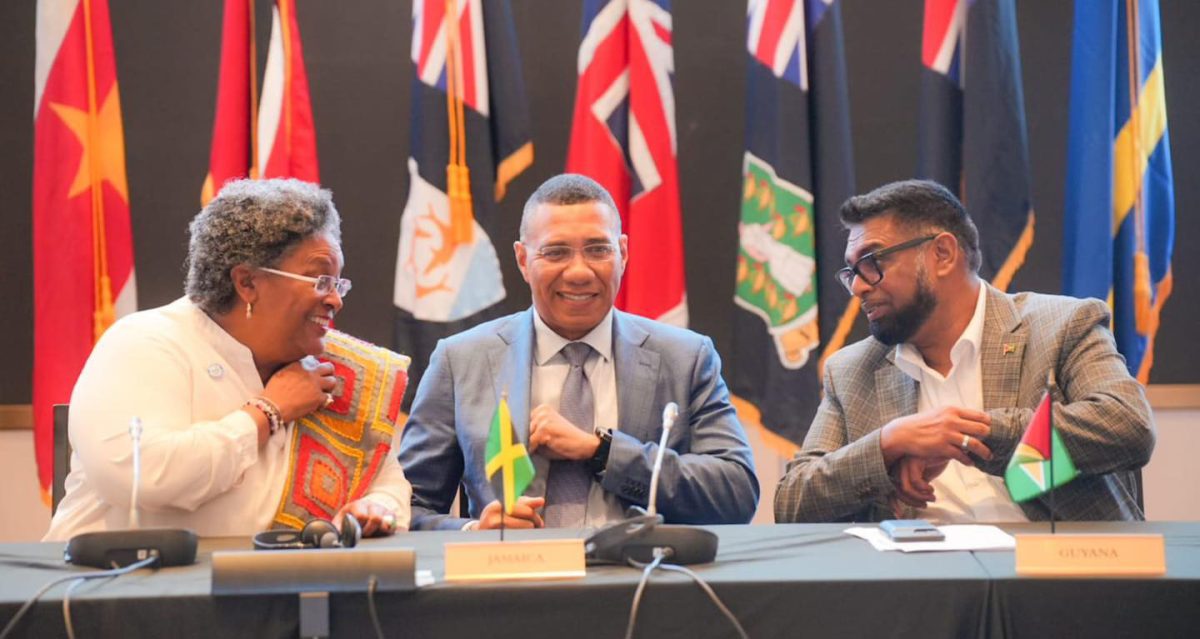Caribbean Community (CARICOM) leaders are seeking an urgent meeting with United States President, Donald Trump, CARICOM Chairman, the Prime Minister of Barbados Mia Mottley said yesterday.
She told a news conference at the end of their 48th regular summit in Barbados that they were in contact with the relevant persons in the US government to seek an urgent meeting with the American leader.
“The President and the Secre-tary of State,” Mottley clarified.
Prime Minister of The Bahamas Phillip Brave Davis, who spoke at the news conference said that there had been many complaints from the business community about the impact of possible changes to US trade policies.
He said that CARICOM received many complaints from its business community about the impact of US trade policies and is concerned, especially as it relates to tariff increases.
“An area of concern would be the general change in US trade policy…the posture of CARICOM is that we must be prepared,” he said.
It is because of this concern that Davis said that a decision was made to “be conducting a very detailed review of our trade situation with the US.” It is expected that by the end of the next three months “a document with a policy direction” on how to deal with any change in US policy will be crafted.
Last August, CARICOM Ministers of Trade met with the United States Trade Represen-tative (USTR), Ambassador Katherine Tai, in Georgetown and discussed expanding their agenda.
It however remains unclear the direction in which those discussions will go under the Trump administration following a flurry of changes since he took office on January 20 with the America First slogan featuring prominently in his actions.
Trump’s attack on the Value Added Tax regimes can also have an impact on the region.
The diplomatic engagement last August aimed at boosting the CARICOM-United States bilateral trade and investment relationship.
The two sides discussed the longstanding trade and investment Caribbean Basin Initiative (CBI) and the need to broaden and deepen the scope of the agenda to cover trade in services, trade facilitation, supply chain development, and support for women and youth employment in micro, small and medium-size enterprises (MSMES). In this regard, the release said that they also acknowledged the recent high-level technical engagements under the CARICOM-US Trade and Investment Framework Agreement (TIFA) and the Trade and Investment Council (TIC).
The United States was represented at the February 19-21 CARICOM meeting by Ambassador to CARICOM and Guyana, Nicole Theriot.
There had been calls from the US House of Representatives for a high-level team at the Barbados meeting.
In a press release last week, Congressman Joaquin Castro (TX-20), Ranking Member of the House Foreign Affairs Subcommittee on the Western Hemisphere, Congressman Gregory W. Meeks (NY-05), Ranking Member of the House Foreign Affairs Committee, Congresswoman Yvette Clark (NY-09), Co-Chair of the Congressional Caribbean Caucus, and Congresswoman Stacey Plaskett (VI-ATL) sent a letter to US Secretary of State Marco Rubio urging the State Department to send a high-level U.S. delegation to the Bridgetown meeting.
“The Caribbean is not just our neighbor; it is a key pillar of U.S. national security. As the third border of the United States, the Caribbean plays an indispensable role in addressing regional challenges, from countering illicit drug trafficking to curbing irregular migration and human smuggling. The Caribbean is essential to U.S. trade and energy security, serving as a crucial hub for shipping lanes and a strategic partner in diversifying energy sources. It is a region where the United States remains the number one trading partner and welcomes millions of U.S. citizens annually, while a vibrant Caribbean diaspora here in the United States solidifies our economic and cultural bridges. Bolstering cooperation with, and the capacity of, our Caribbean partners through high-level engagement serves as a force multiplier for the litany of U.S. national security and economic priorities in the region,” the members wrote in the letter.
The members emphasized the strategic importance of the Caribbean to U.S. national security, economic resilience, and regional stability. The letter also highlighted the need for continued U.S. engagement with CARICOM leaders to strengthen diplomatic, economic, and security ties, particularly in countering illicit drug trafficking, irregular migration, and China’s growing influence in the region.
“Moreover, as the People’s Republic of China (PRC) expands its influence in the Caribbean and Western Hemisphere through investments in energy and port infrastructure, sustained high-level U.S. engagement is necessary to keep PRC coercion at bay. Continued U.S. support for economic development, natural disaster resilience, and democratic governance is crucial to provide an alternative to China’s pernicious model in the CARICOM area, during a year with six national elections–including in two Taiwan-allied states—in the region.
“Engaging with CARICOM also supports the vital regional cooperation that you have indicated is necessary to address the crisis in Haiti. As you know, CARICOM played an instrumental and indispensable role in facilitating a Transitional Presidential Council to lay the groundwork for a Haitian-led process for political and economic stability in Haiti. The Regular Meeting in Barbados will provide the United States an opportunity to rally support for the Multinational 2 Security Support Mission, bolster regional buy-in for a Haitian-led political process, and help address the hemispheric consequences arising from Haiti’s devastating security, economic, and humanitarian crises”, the letter said.
The letter added: “In the spirit of your comments championing a strategy that pays `closer attention to our own neighborhood—the Western Hemisphere,’ we respectfully urge you to take advantage of the opportunity the February CARICOM Regular Meeting provides as a unique forum that brings together all of the Caribbean region’s leaders. Continuing to send a robust and high-level U.S. delegation to the CARICOM meeting—as the prior Administration did—would reaffirm our partnership and demonstrate that we stand with our Caribbean allies in promoting regional security, economic resilience, and democratic governance”.









